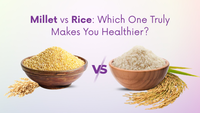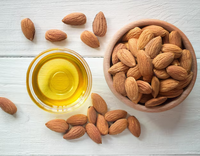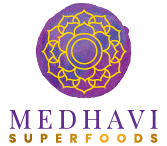In today’s health-conscious world, the phrase "you are what you eat" has never felt more real. With the growing awareness around food quality and nutritional integrity, consumers are actively seeking ingredients that not only nourish the body but also support long-term wellness. One such category under the spotlight is cooking oils, especially chemical-free, cold-pressed, and wood pressed oils.
But what exactly makes these oils different—and better—for your kitchen and your health? Let's explore the benefits of chemical-free cooking oils, with a special focus on wood pressed oils, traditional extraction methods, and why refined oils are losing their place at the table.
What Are Chemical-Free Cooking Oils?
Chemical-free cooking oils are extracted without the use of artificial solvents, preservatives, or high-heat refining. These oils retain their natural nutrients, aroma, and color—providing a healthier alternative to commercially refined oils that often go through bleaching, deodorizing, and high-temperature processing.
In India and across the globe, there's a growing preference for cold-pressed and wood pressed oils, which are produced using traditional, time-honored techniques without chemical intervention.
Wood Pressed Oils: A Return to Tradition
Wood pressed oils, also known as chekku oils or lakdi ghani oils, are extracted using a wooden pestle and mortar setup called the ghani. This ancient method involves crushing seeds slowly at room temperature, ensuring minimal heat and no chemicals are involved.
Benefits of Wood Pressed Oils:
-
Retains antioxidants and vitamins like A, E, and K
-
Unrefined and pure, free from additives and chemicals
-
Rich in flavor, enhancing the taste of your dishes naturally
-
Good for digestion and supports gut health
-
Suitable for skin and hair care routines
Whether it’s wood pressed coconut oil, groundnut oil, sesame oil, or mustard oil—each retains the integrity of its source seed, making it ideal for both culinary and wellness purposes.
Cold Pressed Oil vs Refined Oil
Understanding the difference between cold-pressed and refined oils is key to making better choices.
|
Feature |
Cold-Pressed Oil |
Refined Oil |
|
Extraction Method |
Low-heat, mechanical pressing |
High-heat and chemical solvents |
|
Nutrient Retention |
High (vitamins, antioxidants) |
Low (nutrients destroyed by heat) |
|
Additives |
None |
May contain preservatives and stabilizers |
|
Flavor |
Natural, earthy |
Neutral, often artificial tasting |
|
Health Benefits |
Supports heart, skin, and digestion |
May contain harmful trans fats |
Cold pressed and wood pressed oils are closer to nature. On the other hand, refined oils are often heavily processed, which strips them of natural benefits and introduces unhealthy elements.
Wood Pressed Coconut Oil Uses
Among all the traditional oils, wood pressed coconut oil has earned a loyal following—especially for its versatility and holistic benefits.
Common uses:
-
Cooking: Ideal for sautéing, frying, and baking, especially in South Indian cuisine.
-
Skincare: Works as a natural moisturizer and makeup remover.
-
Haircare: Strengthens hair roots, prevents dandruff, and adds shine.
-
Oil pulling: Used for oral detoxification in Ayurveda.
Its light texture, tropical aroma, and antibacterial properties make it a favorite in both kitchens and vanity kits.
Organic Wood Pressed Oil for Cooking
“Organic” and “wood pressed” is a match made in wellness heaven. Organic oils are derived from seeds that are grown without synthetic fertilizers or pesticides, and when pressed using traditional wooden ghani methods, the result is a pure, chemical-free, and nutrient-rich oil.
Cooking with organic wood pressed oils not only enhances taste but also ensures that your food is free from harmful residues. These oils are ideal for families looking to eliminate toxins from their daily diet.
Nutritional Value of Wood Pressed Oils
Because of their gentle extraction process, wood pressed oils are nutritionally superior. They retain:
-
Essential fatty acids (Omega 3 & 6)
-
Vitamins A, D, E, and K
-
Natural antioxidants
-
Plant sterols that reduce bad cholesterol
This makes them beneficial for heart health, skin glow, immunity, and hormonal balance.
Traditional Oil Extraction Methods: A Sustainable Practice
Unlike industrial oil refineries, traditional wooden ghani pressing is sustainable and environmentally friendly. It consumes less energy, produces minimal waste, and supports small-scale farmers and local oil mills.
The process is slow, but the outcome is meaningful—both for your body and the planet. Choosing oils made via wooden ghani oil extraction supports local artisans, reduces carbon footprint, and aligns with eco-conscious living.
Sustainable Oil Production Methods: A Responsible Choice
Sustainability is more than a buzzword—it's a responsibility. Chemical-free and wood pressed oil production methods:
-
Use biodegradable packaging
-
Encourage local agriculture
-
Reduce dependence on chemical inputs
-
Promote zero-waste oil mills
When you switch to sustainable oil production products, you’re not just investing in your health—you’re voting for a healthier planet.
Why It All Matters
The oils we use every day are more than just cooking mediums—they're part of our wellness journey. Choosing chemical-free, wood pressed, or cold-pressed oils means:
-
More nutrients in your meals
-
No hidden toxins
-
Cleaner cooking
-
Better health outcomes in the long run
In a world full of shortcuts, going back to traditional, natural oil extraction methods is one of the smartest choices we can make for our families and ourselves.
Conclusion
The next time you're in the grocery aisle or shopping online, pause before you reach for that bottle of refined oil. Ask yourself: Is this nourishing me or just filling space?
Opt for chemical-free cooking oils that preserve nutrients, support sustainability, and taste the way nature intended. It’s not just a trend—it’s a return to roots.






